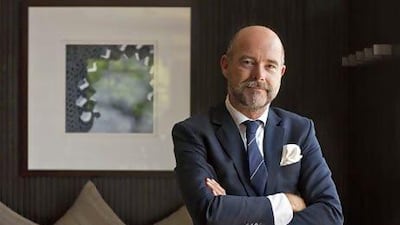John Brash can plausibly claim a chunk of the credit for the international image of the UAE.
The 47-year-old Scot has worked as a branding consultant for some of the Emirates' most enduring and characteristic projects, from skyscrapers to five-star hotels, and from commercial hubs to the global aviation industry.
"Our job is to make the clients look good, so we need to empathise with them," he says.
In the six years he has been running his own business, Brash Brands, in the UAE, he has learnt that a slow, sympathetic response to regional clients' needs is more productive than the "radical makeover" approach typical of the branding industry.
Brash by name, but not by nature.
This approach has won him business from some of the leading companies and projects in the UAE: Burj Khalifa, Emaar, Address Hotels, Dubai Mall, Mubadala, Aabar, Saadiyat Island, the Abu Dhabi Film Festival, are just some of the big-name clients he has worked for. "Amazing accounts", he calls them.
"The UAE matters to us because we are a UAE company. We were born here," he says.
Branding and design has always been his passion. "I graduated in 1988 and got on a cheap bus from Edinburgh to London with my portfolio, because London was the centre of the branding business in the UK. I got a job the same day," he relates.
Stints with international firms like Conran Design and WPP led him all over the world, until his first contact with the Middle East, via his friend James Hogan.
Now the chief executive of Abu Dhabi's Etihad Airways, back in 2002 Mr Hogan was working on the challenging task of rebranding Gulf Air, the Bahrain-based airline under threat from serious regional rivals such as Emirates Airline and Qatar Airways.
"We had to build a regional, rather than national brand at Gulf, and we tried to bring some of the mystique of the Arabian world to it," he says.
WPP, his then employer, asked him to build its branding operations in the region from a new Dubai base, and Mr Brash leapt at the chance.
"Dubai was really rocking back then, and I wanted to build the best office in the WPP global set-up."
He proved so popular with clients that some of the bigger ones backed him when he decided to leave WPP and set up on his own in 2007. "Emaar has been very good to us," he says. But just as the new business was up and running, it was hit by the global crisis and recession that followed.
"But we worked through the downturn, and didn't run away from the region like some others. I suppose you could call it the Scottish work ethic, it's served us well."
There has been a recovery under way since those challenging days, but the branding business has not quite recovered to pre-crisis levels. "It's still tough, because the clients are linked to the global economy and the world is still a difficult place. Clients are getting serviced for lower fees than before," he believes. But he says getting through the recession is his "greatest achievement" in business.
There have been other challenges along the way. The renaming of the world's tallest building as Burj Khalifa in 2011 was one of them. "We had to keep a very big secret under our hats for quite a long time," he recalls.
The recent award of the branding contract for the Etihad Rail transport network was another "big moment". He and his team from Brash had to present to a top-level panel of UAE policymakers in the splendour of the Emirates Palace hotel. "It was one of the most exciting moments of my life," he says. He lists the rebranding of Dnata, previously regarded as a little more than a low-key travel agent, repositioned as the fourth biggest air services provider in the world, as another achievement.
But is the regional branding business something of a small pool for such an ambitious big fish?
He has recently expanded with an alliance with the design arm of Tata, the huge Indian conglomerate, but he still believes Middle East brands face a challenge to become truly global marks.
"It's a tough one. There are brands that break out, like Emirates and Al Jazeera for example, but many are never intended to go global. There are some though that are very well known throughout the world in the target audience, like DP World, or the sovereign wealth funds or, on a rather different level, something like Bateel dates.
"Regional brands are probably more comfortable going into Asia or Turkey. Taking on the world is a big ask for a Middle East brand, though I do have one client that wants to go global from day one," he adds.
The success of his firm must have made Mr Brash a wealthy man, but he insists: "I'm a creative at heart, not a numbers man."

